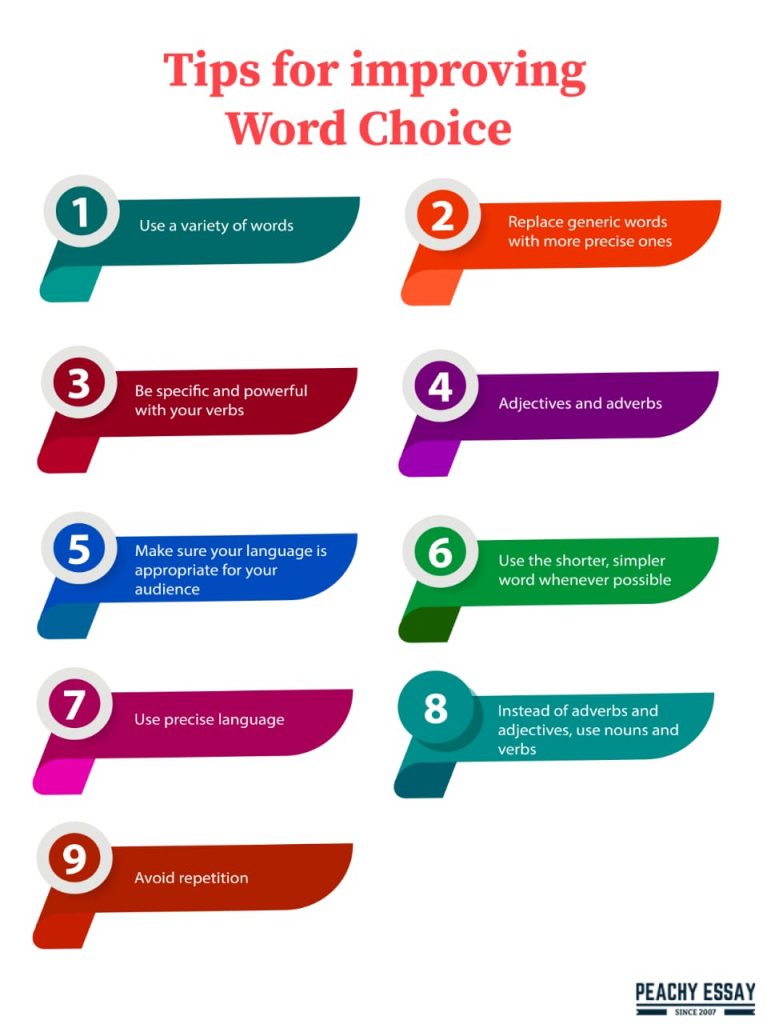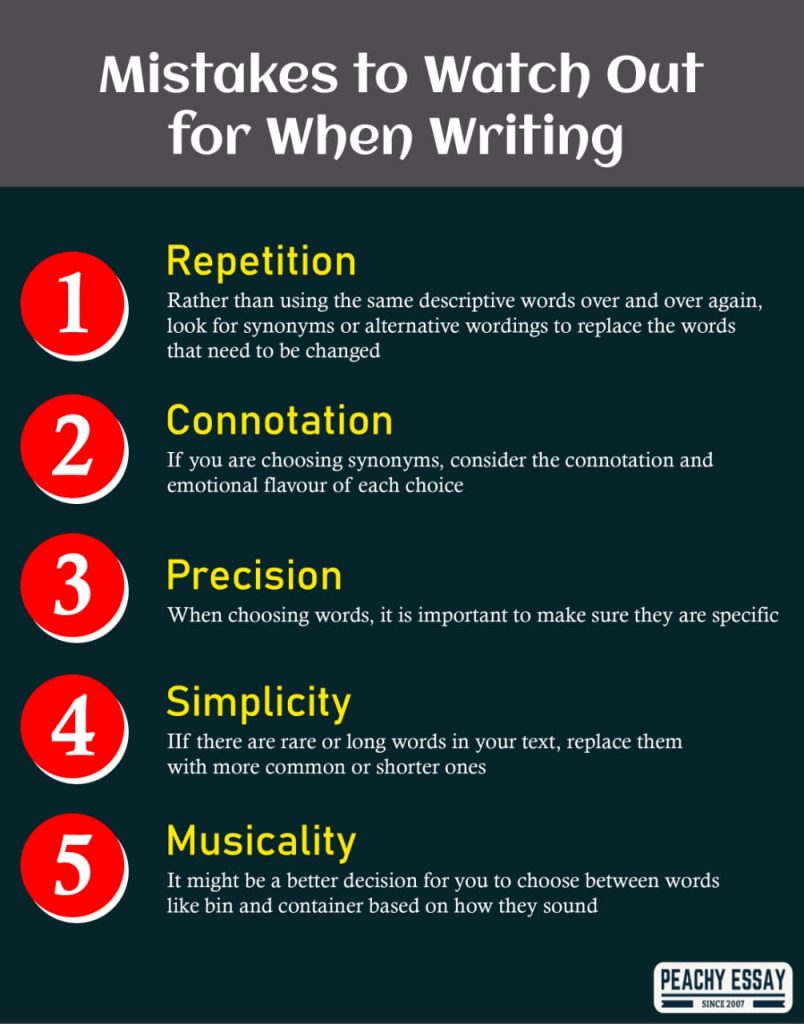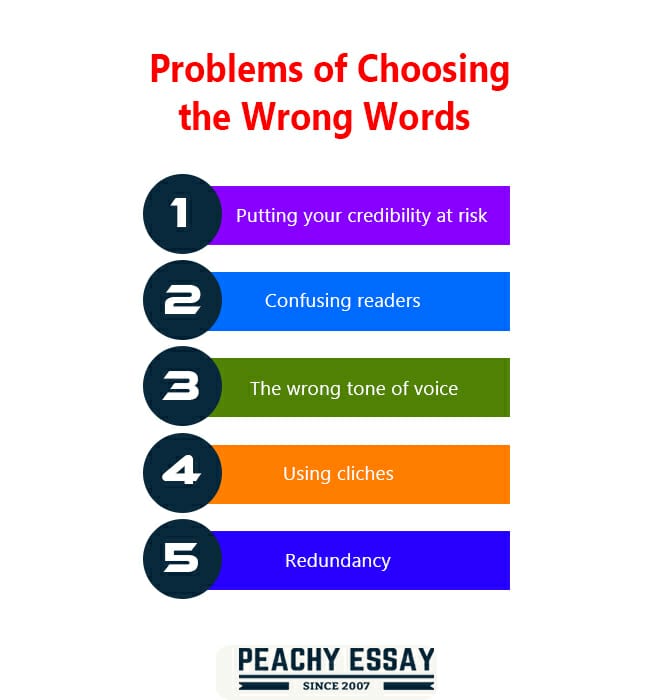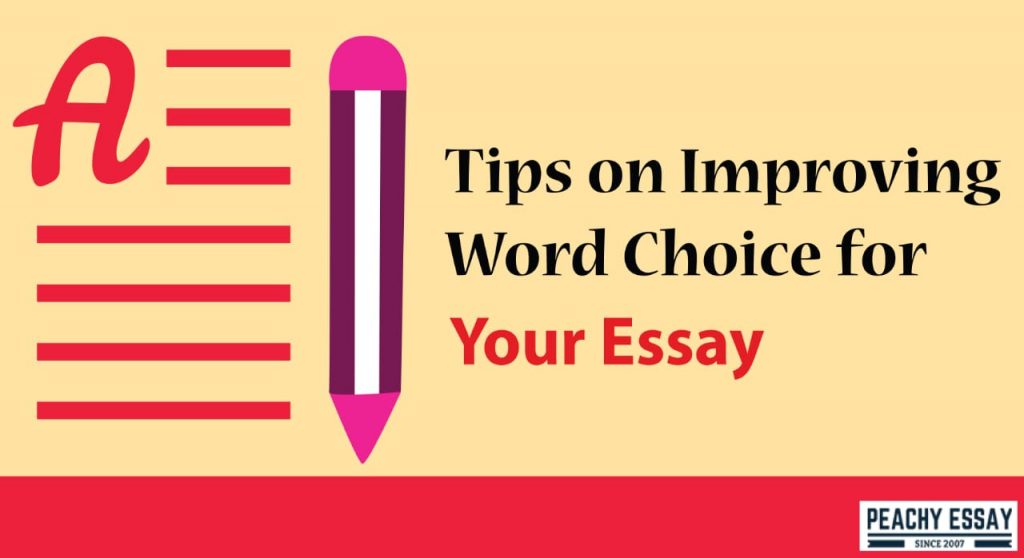A good way to elevate your writing is to pay attention to the words you use. Writing with effective word choices can enhance communication, clarify meaning, and paint a picture for the reader.
In this article, you’ll get in-depth information on how to improve word choice for your essay. Read on to learn more!
Importance of Word Choice
A common characteristic of strong writers is that they understand the importance of word choice. You can use strong word choice to create images and moods in your stories and poems and make them more powerful and vivid by using high-quality vocabulary and language. While the meaning of “word choice” may seem obvious, we must dissect the elements of choosing the right words to transform our writing style and create a more powerful message.
Why is it Important to Choose Better Words for your Admission Essay?
Students are required to write several essays when applying to the college. In some cases, future students are so perplexed and motivated at the same time that they go to unnecessary lengths simply to make their essays better. One of the ways to ruin everything is to use inappropriate words. Imagine that an admissions officer reads the essay introduction and finds there a lot of words that are not common to hear in the teen’s life. From the beginning, such word choices spoil the impression of the entire essay.
Words that do not fit the context are a common issue, and there is a solution. When you use words that are not intrinsic to you in real life, you don’t have to be perceived in the wrong way. Essays should provide evidence of your personality without trying to appear like someone else.
By reading through successful essays, you can identify some of the person’s specific traits just by the words they use. Thus, you should be yourself when writing and strive to create an outstanding impression in your essay by improving your word choice.
The only way to be absolutely certain that your essay is in the right shape and clear is to ask someone else to read it. Having an essay editor means creating replacements for the wrong words and the omissions in your essay.

Use a variety of words
For most writers, habitually choosing and relying on certain words comes naturally. We frequently use specific words in emails, academic papers, and even conversations that we feel comfortable with. If you use 3-5 words frequently, looking for words with the same meaning can add variety. If you often use the word “good,” make a conscious effort to change it to a better word: splendid, excellent, wonderful, or valuable. To learn synonyms (different terms with the same meaning), a thesaurus can be helpful.
Replace generic words with more precise ones
In writing, generic words tend to be used instead of specific words. This is often the case with pronouns such as them, them, her, him, and it. Rather than relying on these pronouns, they can be easily replaced with specific people or names. As a result, the audience will see a clearer, more specific image, and the paper will be more engaging.
Be specific and powerful with your verbs
A verb is a word used to describe an action and is an essential component of a well-written sentence. When writing, a simple way to improve word choice is to choose specific and interesting verbs, words that reveal the action and how it happens. Taking the example of the sentence “I ran to my car in the rain,” the reader is only aware that I ran. In a better sentence, the writer should have used something like “I dashed to my car in the rain.” It is common for writers to overuse linking verbs like “is,” “are,” and “were.” To avoid this, avoid linking verbs whenever possible.
Adjectives and adverbs
An adjective or an adverb adds detail to writing by modifying words in the sentence, most commonly a noun or a verb. In general, writing is more interesting and detailed when it includes more specific adjectives and adverbs.
Consider this example: “The scary dog was big.”
The word scary can be replaced with terrifying, horrifying, or unnerving.
In place of big, you may use huge, immense, vast, or colossal.
When you replace the original adjectives with any of these words, your word choice improves, so your writing gets better.
Make sure your language is appropriate for your audience:
It is important to be aware of the audience when choosing specific words or phrases to use in an academic paper. In academic writing, the instructor and peers are the primary audiences, while in other types of writing, the audience is more informal.
Choosing the right words is crucial to conveying your topic and providing your audience with information they can take in easily. If you are writing an academic research paper for a Psychology course, you should use terms connected to that field. For example, use words such as Sigmund Freud, Operant Conditioning, and Self-Actualization. However, in an English paper reviewing Shakespeare’s themes, those terms would not make sense considering the audience. In addition, it’s critical to explain each term used in research papers to use words that are appropriate to the audience.
Use the shorter, simpler word whenever possible
Thesaurus can help you jog your memory when you’re trying to think of better words, but you should never use one you aren’t familiar with. Using a word that you don’t understand is a big risk since words have meanings that can only be understood when placed in context. This can be a bad game for you, particularly in the case of college admission essays.
Using a simple synonym may be just as effective as using more advanced vocabulary if it clearly conveys your meaning. You can just as easily say “improved the situation” instead of “ameliorated the situation.” Alternatively, “exasperated” is more intense than a synonym like “frustrated,” so if you’re utilizing this word, you should do so.
Use precise language
Make sure the words you use capture your experience accurately and fully. A good example is:
- Vague: During the early stages of setting up our business, I did a variety of tasks.
- Precise: During the initial stages of the business, I contacted potential partners, evaluated the services of our competitors, and adjusted our strategy to meet the needs of local markets.
Consider personal statement examples for college so you can learn which words can improve your essay. In order to diversify the content of your essay, you can make notes and make a list of the words that deserve attention.
Instead of adverbs and adjectives, use nouns and verbs
It is common for inexperienced writers to think that using fancy adverbs and adjectives makes their writing look more eloquent, but in fact, they bog down the rhythm of your writing and sound like fluff. Due to the fact that they are not actual substances, they can also make your writing sound abstract. Writers who are good stick to clear, not-ambiguous nouns, and they use verbs that are active and engaging, too. A better choice of words can easily enhance the quality of any form of written communication.
- Before: Many curious people were waiting anxiously to see their scores as I ran to the board where the results were posted.
- After: In my rush to the board, I found people huddled around, muttering prayers in silence as they awaited the dean’s arrival with their score results.
“Ran quickly” has turned into “rushed.” Instead of “many curious people standing around,” we have changed this to “people huddled around muttering prayers.” We have thus created a concrete image of people muttering prayers rather than an abstract adjective “curious” and a clunky adverb “anxiously.” By focusing on verbs and nouns, we are showing instead of telling.
Avoid repetition
Throughout an essay, avoid using the same word twice in close proximity or the same word repeatedly. Usually, the problem arises from using the same noun that’s central to your topic too often. In addition to explaining how important precision is for describing details, there are synonyms that can be used when discussing themes and topics more broadly. In addition, synonyms play a vital role in improving word choice in essays, as they bring variety and vitality to the content.
When writing an essay about your interpersonal skills, for example, you can use phrases such as “communication skills” and “building relationships that are trusting.””
Word-Choice Mistakes you Should Avoid
An effective sentence depends on the right word. We need to develop a powerful vocabulary if we want our writing to be rich, vibrant, and meaningful. We need to watch out for many common mistakes with word choice as we write, revise, and proofread. By catching and fixing those errors, our writing will improve.
Below are some mistakes to watch out for when writing:

Repetition
Repeated expressions become unnecessary and tiresome when they are repeated in a short amount of time. It is important to repeat some words, especially articles, prepositions, and conjunctions. In a story set on a submarine, the word sub (or submarine) will be repeated often. It’s only normal for that to happen. Nevertheless, the repetition of descriptive words can get monotonous. Every girl is beautiful, every stride is long, and everyone taps their keyboards as they pass by. Rather than using the same descriptive words over and over again, look for synonyms or alternative wordings to replace the words that need to be changed.
Connotation
There are so many synonyms available that choosing the right one can be challenging. There is a meaning to each word, and most words also carry connotations, which shape their expression. In other words, connotations are implied or emotional undertones underlying a word’s meaning. In your story, if your character goes home, it has a very different implication than if she goes to her house. If you are choosing synonyms, consider the connotation and emotional flavour of each choice.
Precision
When choosing words, it is important to make sure they are specific. There will be one word that is vague and nondescript and another that is vivid and descriptive. Take a look at the following sentences:
A poem was written on a piece of paper by him.
A poem was written on a sheet of vellum by the poet.
Regarding the second sentence, it is more visual as the word choice (vellum) is clearly defined. The fix is to use the most precise word available whenever possible.
Simplicity
There is no point in reading a page of your writing that requires you to look up words in a dictionary, and the readers don’t appreciate the feeling of haughtiness evoked by erudite writing. When writing for a highbrow audience, you may pontificate all you like, but make your language accessible in order to reach a wider audience. If there are rare or long words in your text, replace them with more common or shorter ones.
Musicality
The choice of words can sometimes come down to musicality. What does one word sound like compared to another in your sentence? It might be a better decision for you to choose between words like bin and container based on how they sound. You can fix it by reading sentences and paragraphs out loud.
How to Improve Word Choice in Speaking
What is your experience of watching an audience listen to a speaker? What do they do to get the audience’s attention? What is their main concern? Speakers who use engaging language capture the attention of the crowd.
In general, a speaker pays particular attention to the words he or she chooses. When they don’t pay attention to the language choice, how will it affect them? The wrong choice of words can lead to misunderstandings. The worst thing that could happen would be if the audience revolted. It is even possible that some of them may leave that place or the hall as a result.
There is a trick to use the appropriate word amongst the thousands of words that are available to a public speaker or writer. A person can choose a more appropriate word in a number of different ways depending on the situation. These include some of the following:
The following tips will help you to become more fluent in your spoken language.
Slow down slightly
When it comes to thinking, we are much faster than when it comes to speaking. Because of this, you will be able to choose the words you want, as long as you don’t get sucked into frenzy.
Accept imperfection
It’s important to realize that you won’t speak as perfectly as you would like. The truth is, it doesn’t work that way. Instead of trying to find the perfect word, you should settle for one that is good enough. There is no particularly good reason why your listener should care which words you choose or what you planned to say if they know the meaning. So long as the meaning is clear, you will not lose your listener.
Suspend judgment
If you are embarrassed or foolish because you don’t know the perfect word, you will lose confidence and focus. Despite your stumble, you should move forward, forget your mistakes, and focus on what you are saying rather than feeling uncomfortable.
Rehearse out loud
While it is convenient to rehearse in your head, it isn’t the same as rehearsing it out loud. When you practice out loud, your brain is trained in a different way, which appears to help the words flow. During rehearsals, try stating the same content in different words so as not to become fixated on one word or phrase. When you stumble over a word, you still have time to find a replacement.
Focus
Our minds are often distracted when trying to remember the right words to say when we speak. Your focus should be on the message you are communicating, not on the words, and trust that you will have the words when you need them, especially if you have rehearsed aloud. Rather than thinking about what will come next, stay focused on the one thought you have at the time.
Pause
During your speech, you may need to pause to collect your thoughts. There may seem to be an inordinate amount of time between sentences, but it’s not problematic in most cases.
What are the Problems with Wrong Word Selection?
Here are the problems of choosing the wrong word.

Putting your credibility at risk
Undermining your credibility weakens the point you are trying to make in your writing. If you use the wrong word, like “effect” instead of “affect,” it makes you look like you either:
- Submitted a work without proofreading it
- Unsure of the correct word
Confusing readers
When you use the wrong words in your writing, you undermine your credibility and confuse your readers. When a word is used incorrectly, it can make a complete difference to the meaning of the sentence. Take a look at one example:
James and John complement each other at work.
James and John complement each other at work.
The first sentence suggests that Ryan and Nicky praise each other. The second involves them supporting and enhancing each other’s roles.
The wrong tone of voice
Using the wrong word can also affect the tone of your writing. The difference between writing “It was an overcast day” and “It was a gray day” is that one directly describes the weather, while the other paints a picture that is more metaphorical.
Using clichés
By not being mindful of your word choice, you also run the risk of sounding cliché. If you read this carefully, you may catch any clichés, such as:
As dead as a doornail
As blind as a bat
Avoid it like the plague
Is it technically incorrect? The answer is no. Are they making your writing seem uncreative and lazy? This is often the case.
Redundancy
Regarding redundancy, the following examples are redundant:
- The midweek 10 a.m. takes place every Wednesday at 10 a.m. meeting
- It’s hard to believe I won a free gift!
The meeting information is repeated twice in the first sentence. A more concise way to state this would be, “We have 10 a.m. meetings every Wednesday”.
It is redundant to use the word “free” due to the fact that every gift is free. To get even more precise with our word choice: if you won the gift, the word “prize” is more accurate. Therefore, the more appropriate phrase would be: “I can’t believe I won a prize!”.”


